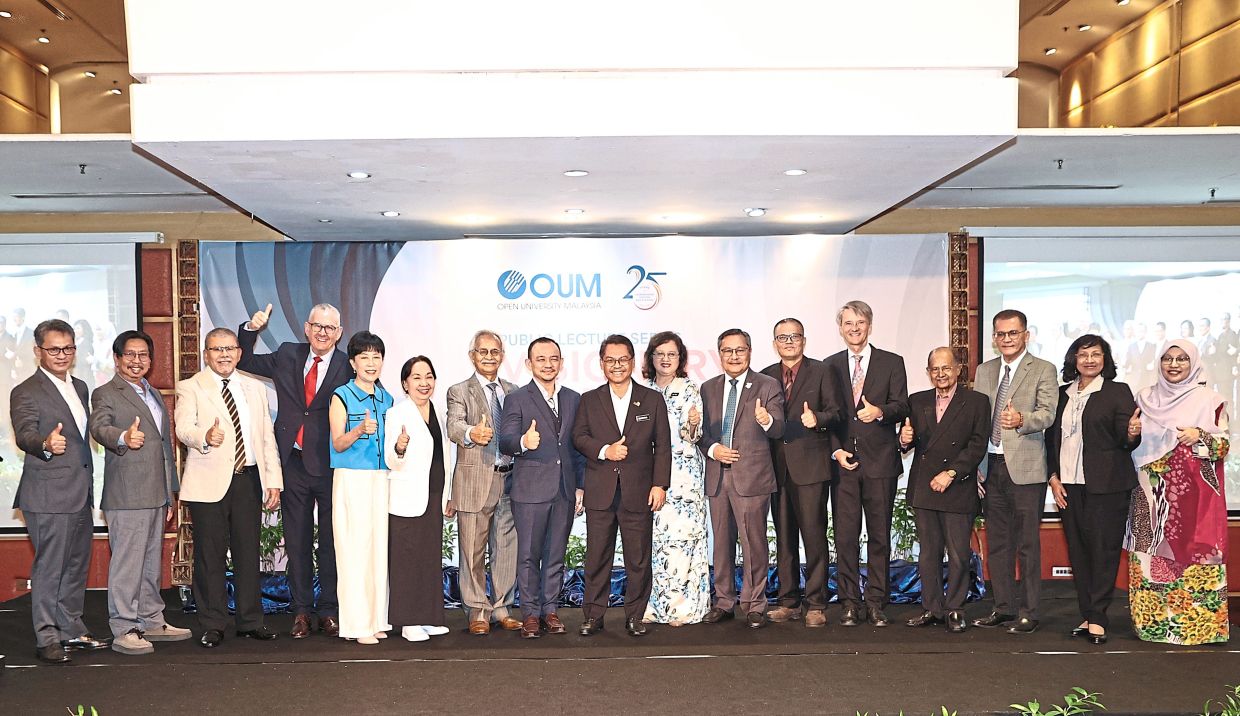AS universities grapple with regulating the use of artificial intelligence (AI) among students, a niche service sector has already emerged.
Third parties are now advertising services on e-commerce platforms to help students bypass AI detectors in their submissions.
These services, marketed as “humanising” AI-generated assignments, involve making machine-produced material sound more like it was written by an actual person. This is done by refining text, replacing overly formal phrasing with more conversational language, or weaving in personal stories and anecdotes.
Stressing the need for varsities to safeguard academic integrity, educators cautioned that this is essential to ensure that students genuinely develop the competencies and skills their qualifications claim to represent.
This, they argued, requires rethinking student assessment models, including moving away from one-off major exams, integrating continuous assessment of the learning process, and introducing formal declarations of AI use - similar to acknowledging collaboration with peers.
“When learning activities are designed to consider not just the final outcome, but also the process, the responses, and how students engage with the material, those elements can serve as meaningful forms of learning assessment,” University of the Philippines Open University (UPOU) development communication Prof Melinda dela Peña Bandalaria told StarEdu.
A former UPOU chancellor, Prof Melinda also served as president of the Asian Association of Open Universities, championing massive open online courses and open educational resources across the region.
“It is no longer just about teaching because knowledge today comes from many different sources.
“Our role is to determine the right level and type of assessment, so we can truly certify that an individual has gained the necessary competencies and skills,” she said.
Rooted in culture
 Prof JungEducation Research Institute visiting research fellow Prof Insung Jung at Seoul National University, South Korea, said students’ reliance on “humanised” AI services is closely tied to societal pressures.
Prof JungEducation Research Institute visiting research fellow Prof Insung Jung at Seoul National University, South Korea, said students’ reliance on “humanised” AI services is closely tied to societal pressures.
“It is a universal issue, especially in societies that place a strong emphasis on achievements and admission into top universities. This pressure tends to be even stronger in Asian cultures,” she said.
The pressure, said Prof Jung - who has over three decades of experience in open, distance and digital education - is compounded by the fact that some institutions discourage AI use, pushing students to conceal it.
“Students often aim to produce quality work quickly, but then conceal their use of AI. This is partly because some education institutions discourage AI use.
“As a result, students resort to using ‘humanised’ AI responses to avoid detection,” she explained.
In contrast, she noted that Japan’s education and employment practices create a different dynamic.
“In Japan, grades matter less because companies don’t hire based on transcripts. The minimum grade requirement is only 1.0 out of 4.5.
“Whereas in Korea, if you don’t have, for example, 3.0 out of 4.5, you don’t even get to apply for jobs at companies,” said Prof Jung, who spent 19 years teaching in Tokyo, Japan.
Agreeing, University of South Africa Emeritus Prof Paul Prinsloo noted that societal norms often influence how students perceive integrity.
“Another factor is when corruption is deeply embedded in a national culture and people routinely get away with it - without naming any specific countries or regions.
“In such environments, students may grow up believing it is acceptable to pay off authorities or buy their way through life.
“This creates a distorted sense of right and wrong, as dishonesty feels justified - everyone is doing it, or they believe they will not be caught,” Prof Prinsloo, whose expertise is in open and distance e-learning, AI in education and the ethics of student data use, explained.
Focus on learning
The real issue, Prof Prinsloo highlighted, also lies in universities’ emphasis on outcomes rather than the learning journey.
 “We did not prepare graduates properly. We focused too much on giving them the right answer instead of teaching them how to think and to find the answer,” he admitted, adding that the focus is now slowly shifting to the learning process.
“We did not prepare graduates properly. We focused too much on giving them the right answer instead of teaching them how to think and to find the answer,” he admitted, adding that the focus is now slowly shifting to the learning process.
A way forward is to integrate continuous assessment into the learning process, Prof Olaf Zawacki-Richter of University of Oldenburg, Germany, suggested.
Outsourcing assignments through student help services is relatively uncommon In Germany due to the country’s academic system, said the varsity’s Faculty of Education and Social Sciences dean.
“Students are not graded frequently as they only receive one graded project per module.
“Learning is project-based and collaborative, so lecturers can observe the students’ process step by step.
“This makes it transparent whether the students actually did the work themselves,” he said.
Even before the rise of AI, some institutions had been experimenting with alternative ways of engaging students in assessment.
Citing an example, Prof Prinsloo said some varsities require learners to evaluate their own work based on a clearly spelt-out guideline.
“Students grade their own assignments according to criteria, and then we compared their self-assessment with ours,” he explained.
Although not foolproof, the approach encouraged accountability by prompting students to reflect honestly on their performance and take ownership of their learning.
“It becomes part of their responsibility to own up and say ‘this is how well I think I did’,” he added.
Be transparent
 Prof XiaoIt is human nature to look for shortcuts, making it crucial for universities to establish mechanisms that ensure responsible use of AI, said Emeritus Prof Junhong Xiao from Open University of Shantou, China.
Prof XiaoIt is human nature to look for shortcuts, making it crucial for universities to establish mechanisms that ensure responsible use of AI, said Emeritus Prof Junhong Xiao from Open University of Shantou, China.
“Whether we like it or not, AI will be used in education.
“We, as educators, ensure that students learn to use AI responsibly,” he said.
Rather than punishing students for turning to AI, Prof Prinsloo advocated embracing it as part of the learning process.
“I want to know how they use AI. What was their process? Did they check the answer? How did they validate the answers? We should be interested in the process,” he said, emphasising that students should be encouraged to use such tools responsibly.
He also underscored the importance of transparency in learning and collaboration, cautioning that punishment of AI use could drive students to discover new ways to cheat.
“One university even has a declaration that students fill in to say, ‘I worked with a colleague or AI in this assignment.’
“We almost always punish them for working together with other students or with technology when we should be open and encourage them,” he opined.
Likewise, Prof Melinda shared that her university has already introduced an AI policy at the institutional level.
Under the policy, students are required to declare and document how they engaged with AI, such as the questions they asked, the responses they received, and how they evaluated those responses.
“We ask ‘How did you use AI in your submission’, for instance?
“They have to track the actions they have taken and document it,” Prof Melinda explained.
She, however, acknowledged the challenges of enforcement, as declarations may not always be complete or fully honest.
“Of course, it’s not a guarantee that they will declare everything, especially if they submitted something that’s completely AI-generated. We still have to reflect and guard against that,” she added.
Note: Prof Melinda, Prof Jung, Prof Xiao, Prof Prinsloo and Prof Zawacki-Richter were speakers at the Open University Malaysia “Visionary Leadership: Charting the Futures of Digital Education” public lecture on Aug 6.
 Thumbs up: Mustapha (ninth from left) with Prof Ahmad Izanee (seventh from right) with the speakers and guests at the public lectures series. - AZMAN GHANI/The Star
Thumbs up: Mustapha (ninth from left) with Prof Ahmad Izanee (seventh from right) with the speakers and guests at the public lectures series. - AZMAN GHANI/The Star
AI in academia
THE Higher Education Ministry is committed to preparing students for a future shaped by AI and digital transformation, says its Deputy Minister Datuk Mustapha Sakmud.
“We are improving how AI is taught and used across our universities.
“We are also building campus environments that support flexible learning, including better Internet access, modern learning spaces, and stronger support for academic staff,” he said at the Open University Malaysia (OUM) “Visionary Leadership: Charting the Futures of Digital Education” public lecture on Aug 6.
Held at a hotel in Kuala Lumpur, the free public lecture series was organised in conjunction with the varsity’s 25th anniversary.
Also present were higher education director-general Prof Dr Azlinda Azman, and OUM president and vice-chancellor Prof Dr Ahmad Izanee Awang.
Subsequently, in a parliamentary reply on Aug 26, Mustapha said the ministry has outlined several measures to address the use of AI in academic writing, namely:
Developing guidelines for AI use in higher education.
Monitoring and regulating practices at the institutional level.
Revising assessment and evaluation methods.
Strengthening teaching and learning approaches that support higher-order thinking skills.
Providing training and professional development.
Upholding a firm commitment to academic integrity.
Ensuring all new and existing courses will include AI-related elements starting from 2025.
Mainstreaming the integration of AI into curricula through an “embedded AI” approach across study programmes, according to the needs of each discipline, such as engineering, technology, social sciences, and service-related fields.
Related posts:
Related news:
The transition from “making AI talk” to “making AI work” is the next frontier of AI commercialization. Could China, with its advantages in AI application, technology and policy support, be a global testing ground for such a transition?
Source link
https://www.thestar.com.my/news/education/2025/09/14/make-ai-an-ally












